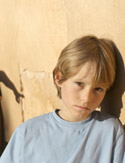Dealing with Bullies

As kids head to school, they have a lot to think about, from classes and teachers to extracurricular activities and seeing their friends again. But in addition to the excitement and nervousness of the new school year, some students also have a major fear on their minds—bullies.
Many children worry about not fitting in, especially because of the teasing and bullying that can go along with it. Intimidation and bullying can not only rob your son or daughter of self-confidence, it can become violent. Watch for warning signs that your child is the victim of a bully—and know how to help.
According to statistics, 160,000 students miss one day of school each year because of bullying. Harvard psychologist Dr. William Pollack, author of Real Boys' Voices, says boys who are bullied hide their feelings because they fear being humiliated, injured or even killed. Many are afraid of the violence they feel inside themselves and fear talking about it. The majority of schools have a policy of "zero tolerance" for bullies, but this can often lead to more violence.
But boys aren't the only victims—and they're not the only bullies. Rachel Simmons, author of Odd Girl Out, says girls are just as aggressive as boys, but they act out in much subtler ways. The effect of this "hidden aggression" is devastating to millions of girls but is often invisible to parents.
"Girls have a terrible reputation for being cruel, and there's a reason why," Rachel says. "They don't feel comfortable showing their anger directly. In order to deal with their anger, they go and tell someone else or they do it in a very sly way. They push their feelings down, but invariably their feelings come out in very secretive or indirect ways. So many of them are sitting on that anger. [Girls] do not have the tools to engage in assertive, direct conflict where they can actually say what's in their hearts to each other."
But boys aren't the only victims—and they're not the only bullies. Rachel Simmons, author of Odd Girl Out, says girls are just as aggressive as boys, but they act out in much subtler ways. The effect of this "hidden aggression" is devastating to millions of girls but is often invisible to parents.
"Girls have a terrible reputation for being cruel, and there's a reason why," Rachel says. "They don't feel comfortable showing their anger directly. In order to deal with their anger, they go and tell someone else or they do it in a very sly way. They push their feelings down, but invariably their feelings come out in very secretive or indirect ways. So many of them are sitting on that anger. [Girls] do not have the tools to engage in assertive, direct conflict where they can actually say what's in their hearts to each other."
Your child might not tell you if he or she is being bullied at school. Look for these warning signs:
- Acts withdrawn
- Has unexplained injuries
- Clothing is torn
- Fears going to school
- Has trouble sleeping
- Mood changes
- Stops talking about school
- Finds excuses to miss school
- Has new friends
- Displays aggressive behavior at home (Sometimes if your child is being bullied, he or she will take it out on a sibling.)
If you see the warning signs that indicate your child might be the victim of a bully, Rachel Simmons says there are ways for you to talk about what's really going on at school.
Ask trigger questions in the third person. For example, ask your daughter, "How do girls treat each other in school?" or "How do you feel when you're at school?" Remember, the most important action you can take is to listen to and hold your child.
Ask trigger questions in the third person. For example, ask your daughter, "How do girls treat each other in school?" or "How do you feel when you're at school?" Remember, the most important action you can take is to listen to and hold your child.
If your child is the victim of a bully at school, you should:
- Take it seriously—don't minimize the experience.
- Keep an open dialogue with your child about the bullying.
- Don't assume the bullying has stopped if your child stops talking about it.
- Give consistent advice.
- Bolster your child's self-esteem in other areas. Help them find an activity where they fit in.
- Don't go it alone. Find other parents whose children are being bullied and organize.
- Remind your child what you like about him or her and encourage them to find a group of allies.
- Contact your child's school to report what is going on.
If your son or daughter admits that they are being bullied, Rachel Simmons says you should:
- Never tell them it's a "normal phase."
- Avoid minimizing their problem.
- Never tell them they are being oversensitive.
- Never tell them that they are doing something to cause the bullying.
- Never tell them that they must be joking.
Even though your child may protest, you must tell his or her school about the bullying and work with the school to make sure it's doing everything possible to protect your child. You can also help your child deal with bullies from the start by telling them to:
What if you suspect your child is a bully?
- Deflect the bullying with humor.
- Speak out—say, 'Stop that. I don't like it!"
- Get friends to help. Ask them to stand up to the bully
What if you suspect your child is a bully?



